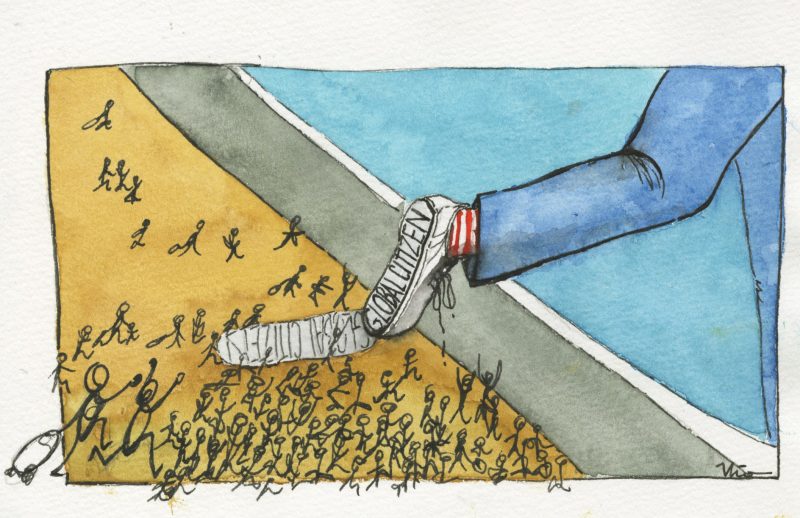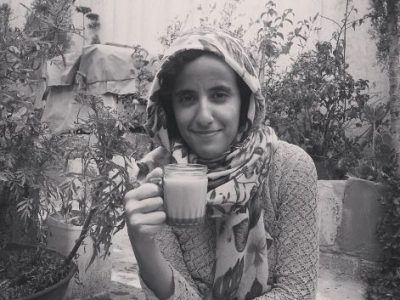
Travel Privilege- Illustration by Violeta Camarasa
[Suggested soundtrack for this post: Subway Walk, by Catalan band La Troba Kung-fú. You can read the lyrics here. Author’s suggestion: get up and sing/dance to it after you finish reading!]
Passports: Technically, they’re just a piece of paper. As valuable as gold or as meaningless as… well, paper (or not even that if it is never issued). It may or may not become some sort of magical powder allowing us to fly around enjoying our basic freedom to move, study or work abroad, learn languages, travel and connect with different people across the world. All of these actions are essential in a globalized world, allowing everyone to access their rights to earn a living and to reach their full potential.
Freedom of movement, the right of everyone to leave any country, including their own, and to return to their country, is listed in Article 13 of the Universal Declaration of Human Rights. In reality, however, only an identity card, passport, and ultimately a visa can grant a person the right to visit or choose to reside somewhere else other than one’s birthplace.
Still others find themselves in extreme situations, needing to cross borders to save their lives, without visas, passports, or even basic needs met. Their is an entirely different story separate from the consideration of what it means to travel.
Traveling, therefore, can be a very different experience depending one’s birthplace and circumstances in terms of the people who hold power both in the country of origin and destination. What is it like to travel the world based on these differences? Here are a few impressions Global Voices (GV) collected from fellow GV members attending our last summit in Colombo, Sri Lanka in December 2017.
Traveling, a bittersweet prospect
For many, the excitement at the prospect of a journey across borders is bittersweet.
”To be honest, visa applications are the least of my favorite activities, especially knowing how embassy/consulate staff looks at my passport”, admits Turkish and Azerbaijani writer Arzu Geybullayeva. “I think one of the worst outcomes of current political affairs both in Turkey and Azerbaijan is the outflow of human capital or brain drain. The current economic and political environment in both countries gives little hope to young people who have started questioning their future and looking into ways of relocating, or at least securing a better future for their children”, she explains. Turkish and Azerbaijani passports are ranked 49th and 75th on the Henley Passport Index, an index of countries according to the travel freedom that their citizens enjoy.
“I get asked questions all the time especially when I am traveling in Europe on my Turkish passport,” she continues, adding: “these experiences make me feel rather frustrated because I am just a human being, a person who wants to travel or has to travel because of work and yet I get treated differently just because my passport is different.”
Arzu’s feelings are similar to those shared by Nigerian writer Nwachukwu Egbunike:
“I had to psychologically prepare myself for another round of visa applications. It's not so easy to get a visa being a Nigerian. My country has no respect for its citizens, why should other countries respect us?”
For him as for many others, travel preparation for attending the GV summit in Sri Lanka involved much more than planning and throwing stuff into a suitcase. Africa has suffered the most dramatic decline in travel freedom, 21 of the 30 biggest fallers since 2008 according to the Henley Passport Index are countries in the region.
“The visa was only granted about 48 hours before my trip. You can only imagine the anxiety”, tells Nwach, and still he was retained both at the departure and arrival airports.
“Obviously, I was angry, it's almost the same every time I travel.” He goes on, “I always have to face an unending interrogation from officials at home and the host country. It's exasperating carrying a Nigerian passport, you are by default labeled a crook until you prove otherwise. Our country’s economy is not strong, the inept and corrupt political leadership over the years doesn’t help either.” But at the end he made it and our days were made more awesome through Nwach’s presence with us.
Enjoy it while you can
Visa requirements don’t last forever and a passport’s ‘magical’ power can expand or contract at any given moment depending on the political dynamics. Peruvian lawyer and writer Gabriela García Calderón tells us how her passport now opens doors that not long ago were difficult to open.
“My passport is not as shitty as it used to be in the 80s and 90s. Back then, when we were dealing with local terrorist groups, a lot of people left Perú, so many countries started to request visas, even those within the region.”
Of course, this also goes the other way around with Venezuela arguably being the best example these days. While still ranked 35th on the Henley Passport Index, in the last few months getting a passport renewed has become a nightmare for many.
Across the world, Venezuelans with expired passports are getting stuck wherever they are, living in a state of limbo due to the government’s inability to manage applications within a serious economic and humanitarian crisis.
For example, education researcher and Global Voices editor Laura Vidal had to stay home while we were all working together in Colombo. She reflects, “the connections and limitations represented by having certain passports (or in my case, not even having it) made me realize that borders, artificial as they are, are powerful, and that being a ‘global citizen’ is actually a luxury given only to certain passport holders.”
Lawyer, writer and human rights activist Marianne Díaz Hernández and journalist Luis Carlos Díaz, also from Venezuela, were luckier, at least for the moment. Marianne, holding a passport that would expire is less than six months, had to trust that a letter from the Department of Immigration & Emigration facilitated by Global Voices managing director Georgia Popplewell would allow her to enter Sri Lanka.
“I had to convince every airport authority from my airport of origin in Santiago de Chile, where I had to wait one hour without knowing if they would finally let me into the plane,” said Marianne.
“I have always used my Spanish passport for traveling, it is very well accepted in many countries,” explains Luis Carlos, and he adds: “also, I know that the Venezuelan dictatorship wouldn’t protect me if I ever find myself in trouble.”
Do you even exist?
A passport is only a passport if it is recognized as such in the world of diplomacy, meaning that it will only be seen as valid if the destination country regards the issuing territory as an actual political entity. If a powerful and influential country doesn’t recognize the authority of that territory, their friends and allies likely won’t either. Does this ring a bell to you? Well, it probably does to our Taiwanese colleagues, whose traveling lives are hanging in balance as China’s power in the world rises.
As writer I-Fan Lin puts it, “due to the ‘One China Policy,’ some countries who have especially good relationships with China cannot recognize our passport.” She explains: “Taiwanese can still use our passports to enter these countries. However, the immigration officers cannot stamp on our passport, or they would be considered to recognize our country…”
A visa, what’s that?
Those with powerful passports in their hands usually lack awareness about traveling as a real hassle for many. “Due to my sexy passport, I feel the world is mine to travel without even thinking twice about visas, for even if I have to apply for them I never imagine it could be rejected,” admits writer Elisa Marvena, who holds a Spanish passport, ranked 3rd on the Henley Passport Index.
It is easier to understand what others go through when you’re married to someone less privileged, like in Tori Egherman’s case: “Having a United States passport makes most travel easy. Plus I’m white, which makes it even easier, but my life partner was born in Iran and nearly every time we travel together, we wonder what awaits us at the border.”
In search of freedom
There are those with ‘golden passports’ while there are those with far less glowing ones covered with layers of fear, anger and frustration. It comes as no surprise that people around the world find millions of ways to try to get hold of those ‘golden’ passports, attaining that ‘magic powder’ not only for crossing borders but for experiencing a more decent, freer global life.
Writer Salma Essam Sherif from Egypt, a country affected by the rise of extremist, violent Islamic groups which have exacerbated Islamophobia and, by unjust association, prejudice before any Arab passport holder around the world, shares her views:
“In many countries, mine included, immigration endeavors are common among young people to be eligible for another citizenship that would give them an opportunity to get a more privileged passport. Some people get married to “first-world” passport holders, some women even flock to the US/Canada/etc to give birth, so they get a passport for their babies.”
Laura notes, “All this is so ironic and contradictory. The real thing is that we are liquid beings from all over that circulate, being regulated by something as artificial as borders. It is those that invented the borders who decide who is global and who is not.”
There is hardly anything more random, and more radically determining for a person’s life, than one’s place of birth. A passport or visa is not something we can earn as a fruit of our own effort. Rather, it depends merely on luck. And there is one rule with luck: we need to be aware and grateful for it. Aware of how privileged some of us are, aware of the unjust and unfair trouble that some travelers go through, and aware that each of us could very well be standing in another person’s shoes. How can we talk about a connected globalized world when being a global citizen is still a privilege of the few that stands on the limitations of the many?



